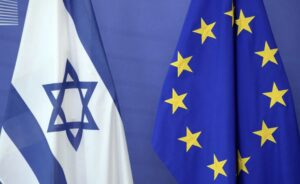 Brussels, December 15th, 2021 – The Middle East peace process will not be restarted anytime soon but it is important to keep the end goal in mind while we in the meantime foster regional cooperation and take concrete steps to improve the living conditions for the Palestinians, Deputy Head of Division, Vladimír Janeček from the EEAS said at the annual ECI Policy Conference on Tuesday. The end goal, according to the European Union, is a final and comprehensive peace agreement between Israel and the Palestinians leading to a two-state solution.
Brussels, December 15th, 2021 – The Middle East peace process will not be restarted anytime soon but it is important to keep the end goal in mind while we in the meantime foster regional cooperation and take concrete steps to improve the living conditions for the Palestinians, Deputy Head of Division, Vladimír Janeček from the EEAS said at the annual ECI Policy Conference on Tuesday. The end goal, according to the European Union, is a final and comprehensive peace agreement between Israel and the Palestinians leading to a two-state solution.
Janeček was joined by Israeli Deputy Ambassador to the EU and NATO, Mr Walid Abu-Haya and MEP Bert-Jan Ruissen who gave their own perspectives on current trends in EU-Israeli relations as well as the normalisation process in the Middle East.
“The two-state solution always seems to be the number one priority in Brussels whereas in the Middle East there are currently many other priorities which are more important,” Abu-Haya noted.
“There will be no Israeli-Palestinian peace agreement in the short term but together with the EU we can take some practical steps in empowering the Palestinian people,” he said.
Whereas there have been no official peace talks between Israel and Palestinians in recent years, the normalisation process between Israel and the Sunni states in the region has been of historical proportions.
“Today there is a clear divide between those in the region who are actively seeking peace and those who fight against it,” Abu-Haya noted.
“The Abraham accords prove that peace in the Middle East is possible, including separate peace agreements between Israel and her Arab neighbours, without a so called final and comprehensive peace agreement between Israel and the Palestinians,” MEP Ruissen observed and continued, “The greatest threat to peace comes today from Iran and its terrorist proxies.”
Janeček confirmed that the goal of the EU is to prevent Iran from acquiring nuclear weapons. Still, according to Ruissen, the EU is not doing enough to stop Iran and its terrorist activities in the region. “In order to be more effective, we need closer cooperation between Israel, the EU and the USA,” he said and added that we also need a firm EU line against terrorist activities and incitement to violence in all its forms.
The ECI Policy conference has been held each year since 2004 in the European Parliament in Brussels during which EU-Israeli relations have been reviewed by the relevant stakeholders, that is, the Israeli permanent mission to the EU, the European Parliament and the European External Action Service.
Commenting on the close relations between the EU and Israel over all those years, Abu-Haya criticized the EU for not keeping the pledges made in the EU-Israel Association agreement to host an annual policy dialogue. “Why has there been no such Council in the last ten years?” he asked. “This is not how you treat close friends.”
Summarising the ECI message to the panellists ECI Founding Director Tomas Sandell compared the historically warm and close ties between Finland and Sweden in saying that Europe and Israel should have similar relations. “Europe and Israel share the same history and the same values while we have common enemies who are bent on our destruction. Quoting former Spanish Prime Minister José María Aznar he warned, “If Israel falls, we all fall.”
You can watch the conference webinar by clicking here.
